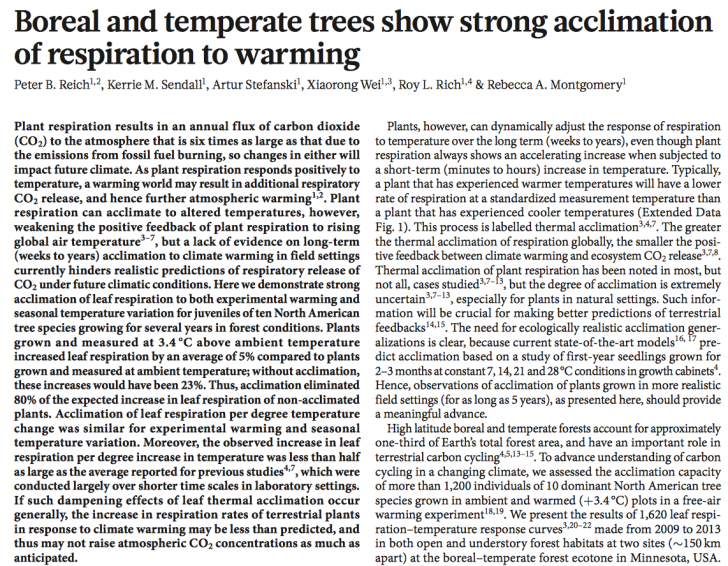More ‘settled science.’
The media release and abstract are below.
###
Climate change: Plants not fazed by global warming
Plants can acclimate their respiration to increased temperatures, as with global warming, much better than previously thought, reports a paper published in Nature. The study shows that trees are able to adapt their respiration rates to long-term temperature increases more effectively than earlier short-term studies found, indicating that plants are likely to play less of a role than previously suggested in speeding up global warming through accelerated respiration and CO2 emissions as the world warms.
Plant respiration makes a substantial contribution to atmospheric CO2 levels, with plants emitting six times more CO2 than fossil fuel burning. Plant respiration increases with temperature, so it has been suggested that global warming could trigger a positive-feedback loop. However, plants can adjust their metabolism, or acclimate, to higher temperatures, which could offset this effect, but the extent of such acclimation to longer-term increased temperature had remained unknown.
Peter Reich and colleagues measured how 10 North American tree species in forest conditions acclimated their leaf respiration over a 3–5 year period to 3.4°C of warming. They show that, owing to acclimation, respiration increased by only 5%, compared to an expected 23% increase in respiration without acclimation, meaning that acclimation eliminated 80% of the increase in leaf respiration expected for non-acclimated trees. They suggest that increases in respiration rates for terrestrial plants, — and the associated increase in atmospheric CO2 concentration — resulting from global warming may be less than anticipated.
###

As nearly as I can tell, they are considering the release of CO2 over the life of the plant, as opposed to simply burning an equivalent weight of coal. Yes, the plant is using more than it releases, but that does not seem important to them. And it is not excess CO2 they were focusing on, but simply warmer temps. A clue would come from the profusion of plant growth in tropical rainforests, but they did not seem to have such clues.
===|==============/ Keith DeHavelle
They seem to have overlooked transpiration / photosynthesis……
The amount of CO2 released at night must be much less than the amount absorbed for the tree to grow at all……
The only place any green plant can obtain carbon is by abstraction from the air; there is no way it can come from the soil.
If the respiration of CO2 from trees into the atmosphere is many times the amount from fossil fuel combustion, the amount of CO2 fixed from the air into the trees must be many, many times the amount released from the fossil fuels……
Sean – I believe your comments to be 100% correct!
Doesn’t the world’s flora convert CO2 to sugar, starch and cellulose? I always thought that higher CO2 allowed faster uptake of the gas in the plant so the plant would evaporate less water as it grew, making it more efficient. It would seem then that more CO2 would lead to greening in areas with marginal amounts of water so overall, there would be a net capture of CO2. Am I missing something?
“Plant respiration makes a substantial contribution to atmospheric CO2 levels, with plants emitting six times more CO2 than fossil fuel burning. ”
I guess it’s time to cut down all trees!